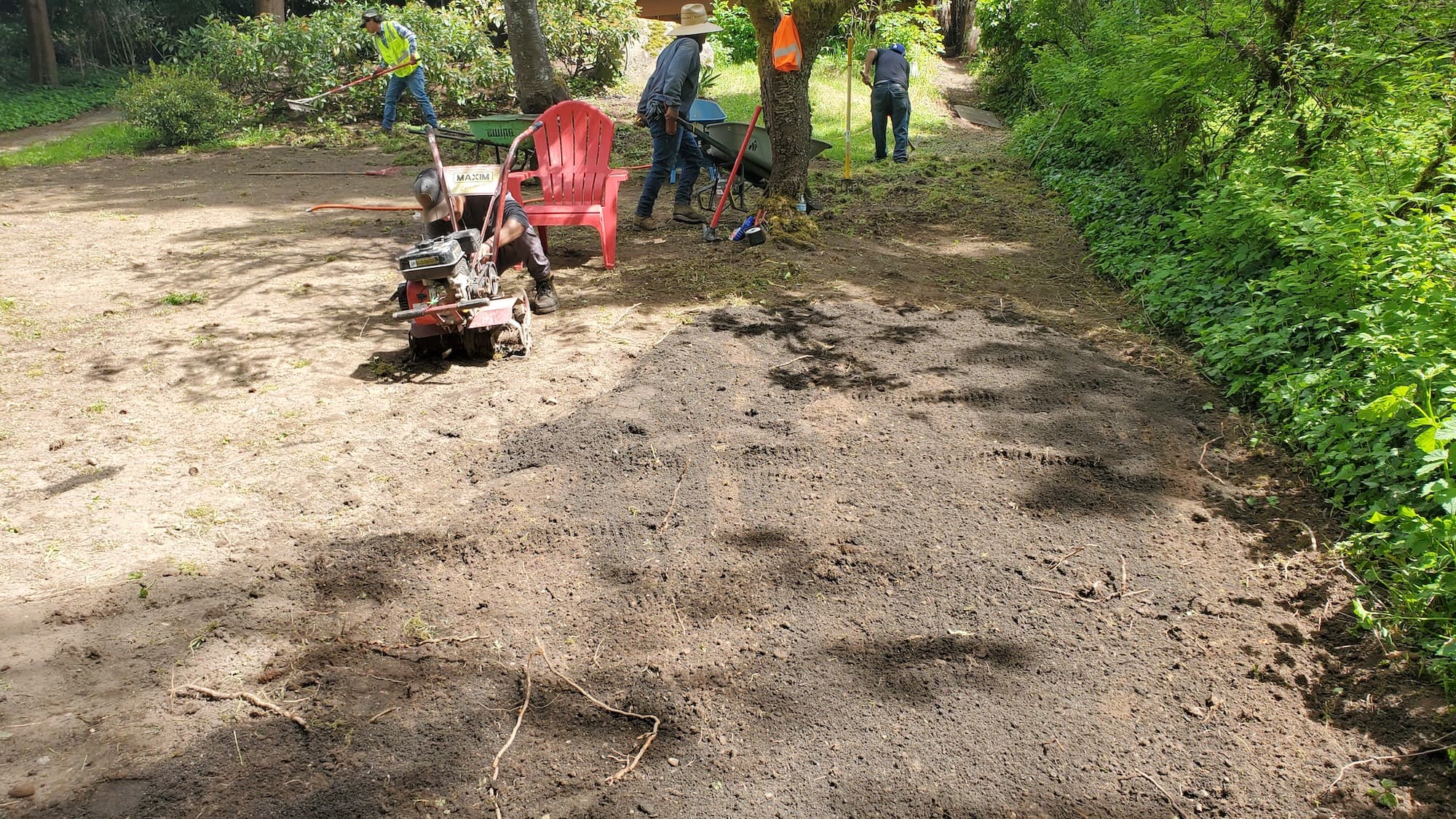West Seattle Curved Gravel Path
Homeowner’s Issue
West Seattle yards face a mix of salty air near Alki, heavy autumn and winter rains, and soils that can be shallow or compacted from past fill. Many properties sit on modest slopes—Admiral and the ridge above Lincoln Park show this—so water pools or channels down paths unless you give it room to infiltrate. Shady, north-facing microclimates in parts of Highland Park and Roxhill encourage moss and persistent ivy, while exposed front yards get wind and occasional salt spray that break down plantings and bind soil.
Homeowners want good curb appeal without a high-maintenance surface that turns to mud during our long wet season. They also must balance HOA sightlines, permitting in some blocks, and summer water conservation rules. Weed pressure here is seasonal but steady: chickweed, annual grasses, English ivy, and horsetail in persistently wet spots. A curved gravel path solves several problems at once—it channels foot traffic, increases permeability to reduce runoff to drainage systems, and sits well with native edge plantings. We install with sustainable methods only: no herbicides, mechanical weed removal, compost amendments, permeable edging, and recycled or locally sourced aggregate wherever practical.
Our Quality Service
We design and install curved gravel paths sized to your yard, matching scale to lawns, planting beds, or driveway approaches. Typical job duration is 1–3 days for a standard path; larger or steeper runs can take 2–4 days with minor grading. We use plate compactors, screenings for a firm base, and recycled crushed rock for the top layer when available.
Local insight drives material choice: coarser base in wet low spots, added cross-slope grading on sloped routes, and buried edging to keep gravel on the run. We avoid chemicals—weed control is manual or thermal, and soil improvements use compost. Benefits are clear: safer walkways in wet months, improved drainage for adjacent beds, lower maintenance in summer, and a finished look that keeps properties tidy without losing permeability.
What’s Included
- Site visit and layout marking
- Clearing and light excavation of the path corridor
- Base preparation: compacted crushed rock or gravel
- Edge installation (steel, plastic, or buried timber per selection)
- Top dressing with 3/8”–3/4” fines or crushed rock
- Final compaction and cleanup
- One on-site walkthrough and care tips
Options / Upgrades
- Weed barrier fabric (helps in most urban beds)
- Mulch + fabric for adjacent planting strips
- Organic weed control and manual ivy removal
- Native low-growing edge plantings (selection and install)
- Haul-away (green bin sorting) vs. on-site composting of debris
Before & After / Expectations
Expect noise from compactors and trucks during setup and some displaced soil. Typical install leaves small piles of spoils that we haul away unless you opt for green‑bin composting. After completion the path will settle over the first wet season; a light top-up of gravel is common in year two.
Care tips for West Seattle
- Remove leaf litter promptly in fall to cut moss and compaction.
- Rake high-traffic spots each spring and top up 0.5–1” of gravel every 2–4 years.
- In shady, damp runs (north-facing slopes) keep edges trimmed and increase airflow to reduce moss buildup.
- Avoid herbicides; use manual pulling and regular maintenance to control ivy and horsetail.
FAQs
Q: How long does a path last before major repair?
A: With proper base and edging, 5–15 years for surface material; periodic top-up and edge checks are normal. Major rework depends on drainage changes.
Q: Will a gravel path be muddy in winter?
A: Not if built with a compacted base and coarse top layer. We grade for runoff and add a harder base in low spots.
Q: Do you use chemical weed control?
A: No. We provide mechanical, thermal, and organic methods only—no herbicides.
Q: Do you handle permits or HOA approvals?
A: We can advise on local rules and provide simple drawings, but HOA approvals are the homeowner’s responsibility unless otherwise contracted.
Call to Action
If you live in West Seattle and want a durable, low‑maintenance gravel path that respects local soil and rainfall patterns, book a free estimate. We schedule quickly, work with sustainable materials only, and tailor paths to slopes and sightlines near Alki and Lincoln Park. Email neatandtidyseattle@gmail.com to get a site assessment and straightforward pricing.










